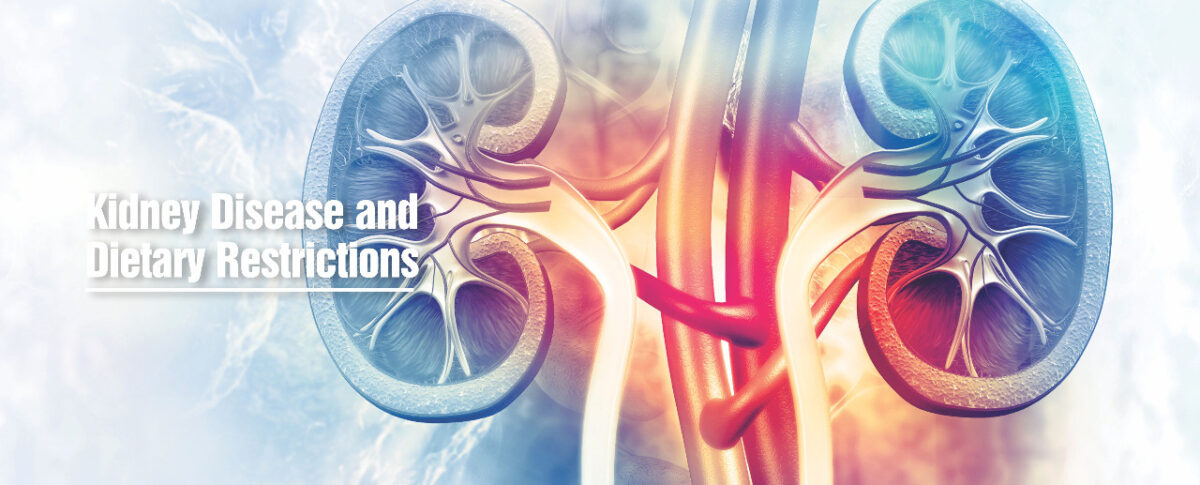Kidney disease is a very common problem that is faced by a lot of people around the world. Kidneys are small organs that perform a variety of important functions like filtering waste materials, releasing hormones that control blood pressure, regulating fluids in the body, producing urine, etc.
Damage to these vital organs can occur in a variety of ways. Therefore, it is important to keep track of what you consume if you have chronic kidney disease. The right diet for your kidneys can help you live longer and healthier.
Some of the common risk factors for kidney diseases are diabetes, high blood pressure, obesity, ageing, genetics, smoking, and high alcohol consumption.
| Contents: 1. Kidney Disease and Dietary Restrictions 2. Healthy Diet for People with Kidney Diseases |

Kidney Disease and Dietary Restrictions
The extent of kidney damage determines the dietary restrictions. People with kidney disease in the early stages face different limitations in comparison to people with end-stage renal disease.
However, the best kidney doctor in Chandigarh recommends all patients with kidney diseases to restrict the following nutrients:
- Sodium: Sodium is a major component of salt and can be found in a variety of foods. Damaged kidneys are unable to flush out excess sodium, causing sodium levels in the blood to rise. Therefore, sodium intake should be kept to less than 2,000 mg per day.
- Phosphorus: Kidney diseases make it difficult for the kidneys to remove excess phosphorus. Since high levels of phosphorus can harm the body, people with kidney diseases should not consume more than 800–1,000 mg of phosphorus in a day.
- Potassium: People with kidney diseases must restrict their potassium intake to prevent extremely high blood pressure levels. Therefore, potassium intake should be limited to less than 2,000 mg per day.
Read More: https://healinghospital.co.in/kidney-stones-symptoms-and-treatment-surgery-hospital-in-chandigarh/

Healthy Diet for People with Kidney Diseases
- Water: Needless is to say how important water is for the body. Water is used by the kidneys to produce urine to filter the toxins produced in the body.
- Cauliflower: Cauliflower is rich in vitamin C, vitamin K, fibre, as well as folate. It also contains indoles, glucosinolates, and thiocyanates, which aid the liver in neutralising toxic substances that could damage cell membranes and DNA.
One cup of cooked cauliflower contains approximately 19 mg sodium, 176 mg potassium and 40 mg phosphorus.
- Garlic: Garlic decreases inflammation, lowers cholesterol, and prevents plaque from growing on your teeth. It contains sulphur compounds that have anti-inflammatory properties and is a good source of manganese, vitamin C, and vitamin B6.
Garlic is a tasty substitute for salt that adds flavour to dishes while also offering nutritional benefits. 1 garlic clove contains 1 mg of sodium, 12 mg of potassium, and 4 mg of phosphorus.
- Onion: Onions are high in flavonoids which help in preventing heart diseases and cancer. Onions are low in potassium, high in chromium, vitamin C, manganese, B vitamins and prebiotic fibres which aid in digestion.
Sautéing onions with garlic and olive oil can be used as a salt substitute to add flavour to dishes without jeopardizing your kidney health. One small onion contains 3 mg sodium, 20 mg phosphorus and 102 mg potassium.
- Apple: Apples are known to lower cholesterol, prevent constipation, and reduce the risk of chronic problems such as heart disease and cancer.
An apple is a healthy snack that contains an essential fibre called pectin. Pectin can aid in the reduction of some kidney-damaging risk factors, such as high blood sugar and cholesterol levels.
- Bell pepper: Bell peppers are rich in flavour, low in potassium, high in Vitamin C, Vitamin A, Vitamin B6, folic acid and fibre, all of which are good for kidneys.
Bell peppers are also beneficial for your health because they contain lycopene, an antioxidant that helps to prevent cancer. A small red pepper contains around 3 mg sodium, 156 mg potassium, and 19 mg phosphorus.
- Cabbage: Cabbage is high in phytochemicals that break down free radicals before they can cause damage. Many phytochemicals have also been linked to cancer prevention and treatment, as well as improved cardiovascular health.
Cabbage is high in vitamin K, vitamin C, fibre, as well as vitamin B6 and folic acid. It is high in insoluble fibre, which helps in improving digestion. It’s also low in potassium, phosphorus, and sodium, with one cup of shredded cabbage containing 13 mg of sodium, 119 mg of potassium, and 18 mg of phosphorus.
Also Read: https://healinghospital.co.in/physical-fitness-for-people-with-chronic-kidney-disease-15-tips/
Other foods recommended for good kidney health include fish, egg whites, berries, red grapes, cherries, olive oil, radish and pineapple.
All these foods are great for those on a renal diet. However, you should also consult your kidney doctor about your food choices to ensure that you are pursuing the right diet for your specific needs, depending on the type and severity of your kidney disease.
Book an appointment with the best kidney doctor in Chandigarh here: https://healinghospital.co.in/nephrology-hospital-in-chandigarh/
























